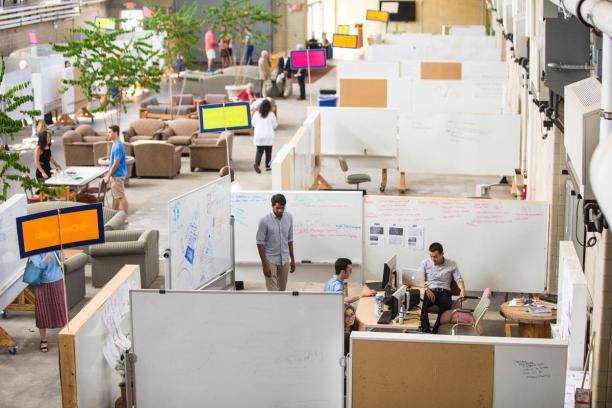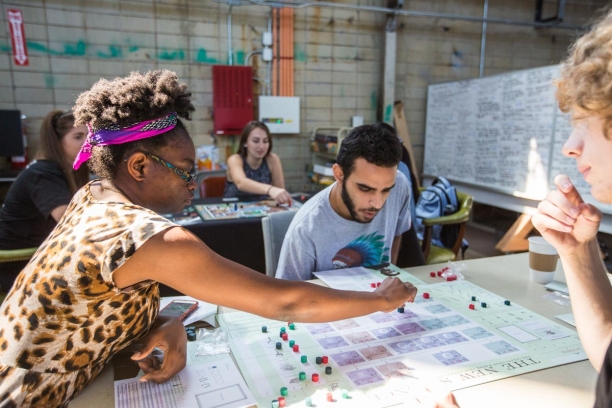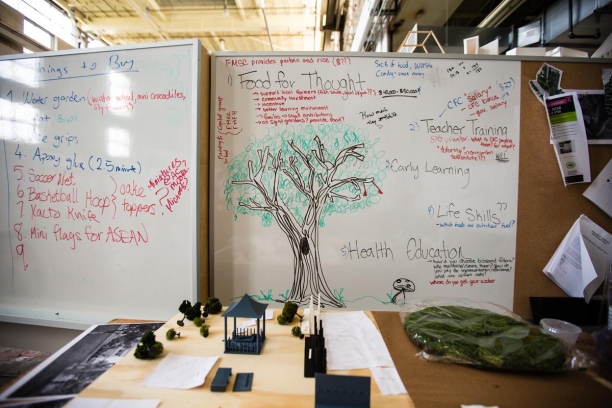From Experience to Impact: A Step Forward for Mountaintop

Lehigh will fund 13 exciting, high-impact Mountaintop projects during the summer of 2017.
Since its launch in the summer of 2013, the innovative and acclaimed Mountaintop program has offered Lehigh students the opportunity to challenge themselves to work outside their comfort zones, to work across disciplines to tackle problems of all kinds, and to rethink the very essence of the university experience.
Now entering its fifth year, Mountaintop is poised to evolve in concept and to expand beyond the walls of the Mountaintop campus itself, as Lehigh aims to enable even more students, faculty, and external partners to collaboratively pursue open-ended inquiry and embark on new intellectual pathways, spreading the ethos of Mountaintop into all aspects of the Lehigh experience.
This summer, Lehigh will fund 13 exciting Mountaintop projects, each of which was selected because of its potential for continuation and to make real, lasting impacts on our community and our world. Additionally, students will have the opportunity to once again participate in the Launch Bay C Student Idea Accelerator, an immersive entrepreneurial experience led by Lehigh’s Baker Institute.
“Mountaintop has been an important step forward for Lehigh, delivering to students a powerful learning experience that is unique in the world of higher education,” said Khanjan Mehta, vice provost for creative inquiry and director of the Mountaintop initiative. “Building on our wonderful successes, our goal now is to help students and faculty conceive, develop and deliver on high-impact Mountaintop projects that will further bolster Lehigh’s reputation as a hands-on university that not only takes on great problems, but strives to solve them.”
Mountaintop teams this summer will develop a scalable method for 3D printing of concrete; explore the genetic underpinnings of creativity; examine the powerful political phenomenon now known as “fake news;” seek ways that design can be used to address and assist mental health; examine the feasibility of “parklets” in Bethlehem’s south side; and develop a sustainable mushroom growing and production system for farmers in Cambodia, among other ambitious projects.
Summer 2017 also marks the second consecutive summer that Lehigh students will work with students from the Pratt Institute, the premier design-focused university in Brooklyn, NY. In addition to the Pratt students who will participate in Bethlehem this summer, for the first time as part of this partnership, Lehigh students will travel to New York to work with Pratt students and faculty at the Brooklyn Fashion + Design Accelerator, where they will work to pioneer the technology of wearable fabrics.
Moving forward, Mehta says Lehigh is committed to making Mountaintop a year-round experience, which would represent an important step forward for the initiative. Toward that end, projects will no longer necessarily be limited to the summer months, and for-credit experiences--ranging from smaller, individually led or group-based projects to intensive, multi-semester projects--will be available starting in the Fall of 2017.
“The evolution of Mountaintop bolsters Lehigh’s ability to develop the leaders of tomorrow,” said President John Simon. “We are proud of all that we’ve accomplished at Mountaintop over the past four summers, and we look forward to making this powerful experience something that Lehigh students can take part in year-round here on campus, in our local community and around the world.”
“Lehigh prides itself on being a university that is always searching for new, innovative ways to educate its students,” added Provost Pat Farrell. “Mountaintop has certainly allowed us to do that, and our plan to build on our momentum and push this initiative forward stands to benefit our students, our faculty and our university as a whole.”
A full listing of the Summer 2017 projects can be seen below.
Advancing 3D Concrete Printing: Methods, Materials, and Applications
Team: Paolo Bocchini, Nicholas D’Angelo, John Fox, Joseph Ingaglio, Clay Naito
Abstract: How can concrete be produced using a 3D printer? Although concrete is arguably the most widely used building material in modern construction, its primary drawback is the requirement of the costly formwork needed to shape and support itself during initial construction. This project will build on initial work begun last summer at Mountaintop. The team will work with 3D printer manufacturer Exone, as well as Buzzi Unicem, USA, a global leader in cement production, who will be providing their expertise as well as specialty products to develop new 3D printing technology and innovate useable printed concrete.
Beyond Paper and Pencil: Creating an App to Assess Student Motivation
Team: Kyle Berman, Mooi Choo Chuah, Bridget Dever, Emily Gallagher, Tom Parker
Abstract: How can we make students responsible for their own academic motivation? Motivation is a key component of students’ educational success, and has been linked to positive outcomes including curiosity, desire to learn, and academic performance. This project will combine expertise in education and computer engineering to create an app that could be accessed directly by students to assess and monitor their own motivation toward academics. Putting ownership into the hands of students aligns with decades of research on the importance of intrinsic motivation in promoting academic success. This new method of tracking motivation could also assist teachers and administrators to improve outcomes in the classroom.
Data, the Internet of Things, and the Empowerment of Everyday Decision-Making
Team: Haiyan Jia, Jeremy Littau, Sarah Stanlick
Abstract: How do we make sense of the endless stream of data in our lives, and how can we use this knowledge effectively? Gadgets, trackers, and apps surround us. In addition, the Internet of Things, and the weaving of technology into everyday experience redefines our behaviors and our ability to connect with people and machines. The new knowledge economy demands that we develop the skill set to be a conscientious consumer of data. This project will examine topics around data, journalism, civics, and technology, and seek to develop tools to help address this challenge by improving data literacy, critical reflection, and ethical decision- making.
DataLight, an Interactive New Media Installation
Team: Eric Baumer, Julianne Koch
Abstract: What do your personal data look like? This project will create DataLight, an interactive new media installation to provide people with an intuitive, visceral understanding of their own personal data. Users' data will be collected and analyzed, and the results will be projected onto a set of WiFi-controlled smart lights. The result will be an innovative artifact bringing together technology and art to create a resource that any organization could use to explore novel ways to visualize and interact with data. It will be displayed at a variety of public venues, on Lehigh’s campus, and elsewhere in the Lehigh Valley and beyond.
Fake News: Engaging People with Online Information of Limited Credibility
Team: Nancy Carlisle, Haiyan Jia, Gordon Moskowitz, Dominic Packer, Joseph Vitriol
Abstract: What is “fake news,” and what happens when we encounter it? This project will focus on the ways that psychological factors interact with technology to affect attention to and persuasion by the news media. Some of the major questions to be considered include: the credibility of news sources; the methods through which the news is received, with a special emphasis on interactive media; and how those factors change the ways we perceive and process the viability of the news that we receive. The team will bring together experts from psychology and journalism, and will utilize a range of research techniques to explore how people receive and are deceived by information from news sources.
Growing Mushrooms to Fight Poverty and Food Insecurity in Cambodia
Team: Samuel Evers, Lauren Fosbenner, Bryant Lindsay, Khanjan Mehta, Mark Orrs, Tim Predmore, Sanjana Shree
Abstract: Over 80% of Cambodians are engaged in agriculture, chiefly cultivating rice. Rice can only be grown eight months of the year, leaving four months in which farmers are forced to migrate to cities to find employment. Mushroom cultivation is an attractive source of alternative work and supplemental income. Locally-designed and assembled small-scale mushroom production facilities are gradually being adopted in rural communities. This project will continue work which began in the spring 2017 Sustainable Development Solutions (SDEV 201) course where students designed durable, standardized, and water-efficient “mushroom houses” and explored context-appropriate processing and storage methods. The team will travel to Cambodia in July and August to field-test their designs in collaboration with in-country partners.
Health Care for All: Reimagining Street Medicine to Improve Healthcare Delivery Models for Vulnerable, Isolated, and Rural Populations
Team: Ana Alexandrescu, Sarah Stanlick
Abstract: How can we take best practices from the institutional health care world into the area of street medicine to serve those most vulnerable among us? “Street Medicine” is a concept that originated in Pittsburgh with Dr. Jim Withers, a physician and founder of “Operation Safety Net.” This grassroots volunteer-based idea has been effective, empowering, and has opened opportunities to utilize his techniques in other areas where vulnerable populations exist. This project will examine information about care delivery, impediments to access, and isolated or vulnerable populations, ideally setting a foundation for a street medicine movement in Bethlehem which could be replicated in low-resource settings around the nation and the world.
Improving the Walkability and Increasing Students’ Use of the South Side
Team: Matthew Lubitz, Karen Beck Pooley
Abstract: How can we develop and design simple urban spaces to build community and increase quality of life? This project will build on the “parklet” movement, which began in San Francisco roughly 10 years ago and has appeared in urban neighborhoods in Philadelphia and elsewhere. Parklets, as the name suggests, are parks in miniature, which aim to reduce driving and encourage walking, and can also serve as spots for outdoor dining, enjoying locally-made artwork, exercising, and socializing. They are ideal laboratories for studying the types of things that best enhance the public realm. This project will research, develop, design, and install low- cost parklets throughout Bethlehem’s south side and discover which models work best.
Intentional Design: Addressing and Destigmatizing Mental Illness
Team: Bill Best, Jen Brukhman, Deanna Kocher, Caleb Leaser
Abstract: How can product design help those living with mental health issues? This project will address seemingly "invisible" mental struggles and society's response to them through exploring the design of physical objects. The best designed objects aren't just used; they can both raise and answer questions. This project will design objects that prompt the right questions while beginning to provide useful answers. It will explore questions of the relationship between design and psychology, and how this relationship can be leveraged in the field of mental health, and how objects can begin to invoke or change thought processes – ultimately creating objects that may be useful to a variety of different members of society.
Jamrooms
Team: Tom Collins, Chris Coulon
Abstract: Would you like to jam with someone on the other side of the world? This project will develop an online space where users can collaborate to create loop-based music. Like multiple people editing a Google Doc simultaneously, but in sound! These “Jamrooms” will allow us to explore questions surrounding the process of music creation and its potential benefits in educational settings, as well as the ways that all-access participation in making music could reduce barriers to access to that creative process. The final product may be like a Web radio station, where visitors can listen in on active jams and then jump on and create their own. It’s going to be one big jam in the cloud!
LaunchBayC Student Idea Accelerator
Team: Lisa Getzler, Chris Kauzmann
Abstract: LaunchBayC is an opportunity to become immersed in a culture of creativity, innovation and entrepreneurial thinking and doing unlike any other Baker Institute experience. The cohort is divided into three tracks to maximize and customize the students’ experience. The Creativity track is focused on students who want to become innovative problem solvers in an entrepreneurial way but haven’t identified their area of interest. The Innovation track invites students to apply who’ve identified the problem area in which they’d like to create an entrepreneurial solution. Finally, the Entrepreneurship track includes students who are already moving toward launching their startup. The program concludes with a Demo Day to which the public is invited and each student participant will have created a digital portfolio of their work.
The Neurogenetics of Creativity
Team: Donna Heiland, Julie Miwa, Amir Parsa
Abstract: What is the nature of creativity? What neural underpinning enables creative thought? This project will embark on an exploration of the mysteries of creativity, and endeavor to define the genetic requirements which brings this process to life. Beginning with the hypothesis that genes can enable or restrict the brain from access to creative thinking programs, the team will perform cognitive assessments and collect samples from people, to correlate a battery of cognitive traits with specific learning-related genes. In the end, the project will generate a more explicit and measurable definition of creativity from these explorations, and to promote innovative thinking and creativity in everyone.
Recycled Drywall Gypsum Conversion to High Value Products
Team: Jonas Baltrusaitis, Angela Brown, Kenny Honer, Himanshu Jain, Eren Kalfaoglu, Alberto Lamadrid, Carlos Pico
Abstract: What would happen if thousands of tons of waste got repurposed into useful new life? Drywall gypsum is currently generated at an estimated 700,000 tons annually in the eastern United States, but it is either transformed into products of low value, such as soil amendments, or disposed in landfills. This project will explore whether and how gypsum dry walls can be converted into high value fertilizers, artificial bone substitutes or glass-ceramics for tissue engineering.
TEK-TILES
Team: Debera Johnson (Executive Director, Brooklyn Fashion + Design Accelerator, Pratt Institute)
Abstract: How can the fabrics in our garments “talk” to us and each other? The Brooklyn Fashion + Design Accelerator (BF+DA) is a vibrant entrepreneurial community that shares core values – humanity, the environment and collaboration. This summer, BF+DA, working with students from Lehigh, will embark on a new initiative, called TEK-TILES, the focus of which is to explore the design and manufacture of textiles and garments that are embedded with materials ranging from sensors to conductive yarns and nanotech fabrics. Imagine a glove that can “talk” to a physical therapist, or a simple undershirt that can keep track of a grandfather with Alzheimer’s via an app, or a shoe that predicts a diabetic lesion ahead of time.
Posted on:






